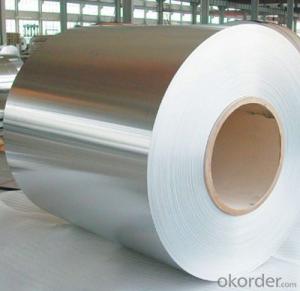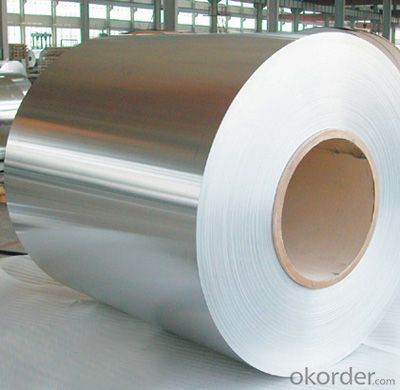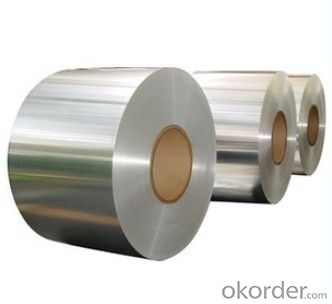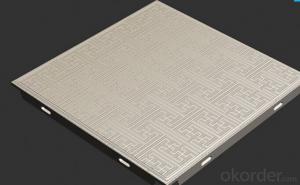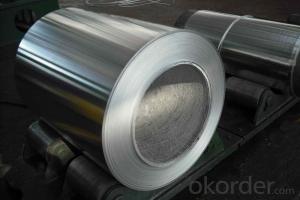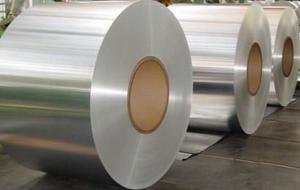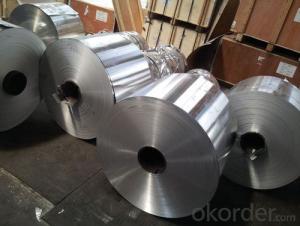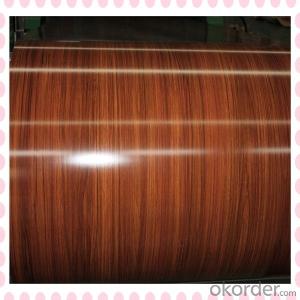Aluminum Sheet Metal Coil - EN AW 5050 Aluminium Coil for Refrigerator Panel
- Loading Port:
- Shanghai
- Payment Terms:
- TT OR LC
- Min Order Qty:
- 10 m.t.
- Supply Capability:
- 1000 m.t./month
OKorder Service Pledge
OKorder Financial Service
You Might Also Like
Specification
1. Structure of EN AW 5050 Aluminium in Coil Form for Refrigerator Panel Description
EN AW 5050 Aluminium in Coil Form for Refrigerator Panel is one semi-finished aluminium material. This coil can be rolled down to aluminium coil,sheet,circle ect. The alloy AA1050 is widly used in building, industry ect. Its weight is much lower than steel. So many customers choosed aluminium material instead of steel.
2. Specification of EN AW 5050 Aluminium in Coil Form for Refrigerator Panel
EN AW 5050 Aluminium in Coil Form for Refrigerator Panel | |
Main Specification | |
Alloy | AA1xxx (AA1050, AA1060, AA1070, AA1100 etc.) |
AA3xxx (AA3003, AA3004, AA3005, AA3105 etc.) | |
AA5xxx, AA6XXX (AA5052,AA5083, AA5754, AA6061, AA6062 etc.) | |
AA8xxx(AA8011, AA8006 etc.) | |
Temper | H14,H16, H18, H22, H24, H26, H32,O/F, T4, T6, T651 |
Thickmess | 0.01mm-100mm |
Width | 30mm-1700mm |
Standard | GB/T 3880-2006/ASTM |
Special specification is available on customer's requirement | |
3. Application of EN AW 5050 Aluminium in Coil Form for Refrigerator Panel
(1).Interior: wall cladding, ceilings, bathrooms, kitchens and balconies, shutters, doors...
(2).Exterior: wall cladding, facades, roofing, canopies, tunnels,column covers , renovations...
(3).Advertisement: display platforms, signboards, fascia, shop fronts...
4. Feature of EN AW 5050 Aluminium in Coil Form for Refrigerator Panel
Surfact Quality :
Be free from Oil Stain, Dent, Inclusion, Scratches, Stain, Oxide Dicoloration, Breaks, Corrosion, Roll Marks, Dirt Streaks and other defect which will interfere with use,
Mechenical Property:
Chemical Composite and Mechanical Property
5. Certificate of EN AW 5050 Aluminium in Coil Form for Refrigerator Panel
SGS and ROHS(if client request, paid by client), MTC(plant provided), Certificate of Origin(FORM A, FORM E, CO), Bureau Veritas and SGS (if client request, paid by client), CIQS certificate
6. Image of EN AW 5050 Aluminium in Coil Form for Refrigerator Panel
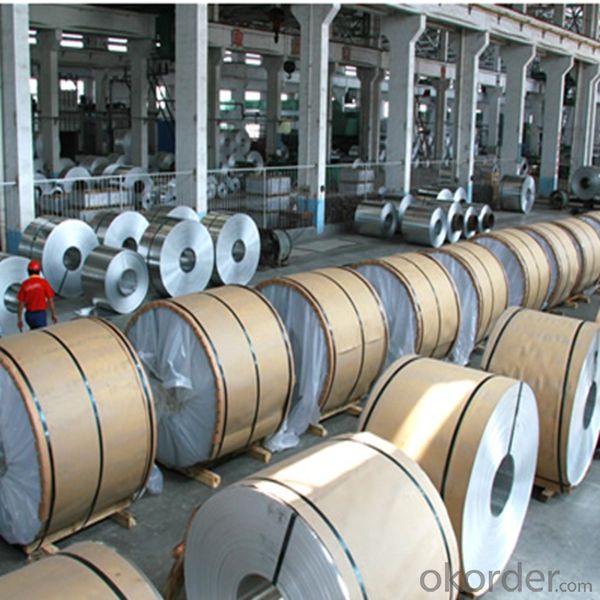
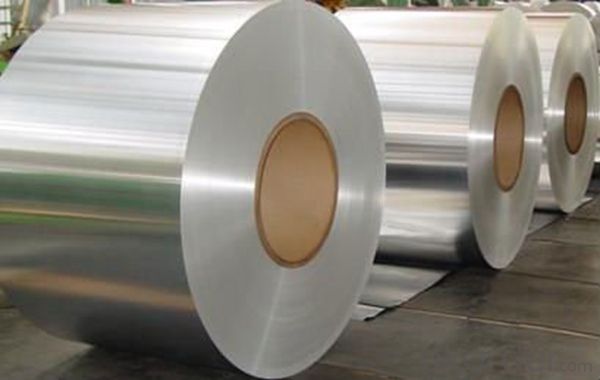
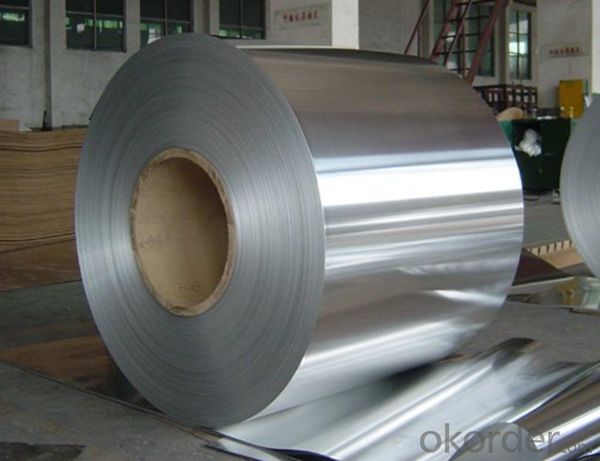
7. Package and shipping of EN AW 5050 Aluminium in Coil Form for Refrigerator Panel
First, plastic cloth with drying agent inside; Second, Pearl Wool ; Third, wooden cases with dry agent , fumigation wooden pallets, aluminum surface could cover blue PVC film
8. FAQ
1) What is the delivery time?
Depends on actual order, around 20 to 35 days
2) What is the QC system:
We have QC staff of 20 persons and advanced equipment, each production is with MTC traced from Aluminum ingot lot.
3) What market do you mainly sell to?
Australia, America, Asia, Middle East, Western Europe, Africa etc
- Q: Are aluminum coils suitable for architectural louvers?
- Yes, aluminum coils are suitable for architectural louvers due to their lightweight nature, durability, and corrosion resistance. They can be easily shaped and formed into various louver designs, providing both functionality and aesthetic appeal to architectural structures.
- Q: What is a better deal?Aluminum Cookware ( Paula Deen)orHard Anodized ( Rachael Ray )
- The okorder /
- Q: Please tell me the the size of the piece of aluminum that you give the weight messurements.
- aluminums gravity is 2.70 and weighs 1.423 troy ozs per cubic inch a note specific gravity of any metal or alloy is weight in grams of one cubic centimeter. also most metals use troy weights and to find troy weight of one cubic inch of any metal or alloy multiply specific gravity by a constant of 0.52686
- Q: How are aluminum coils tested for surface cleanliness?
- Aluminum coils are typically tested for surface cleanliness using various methods such as visual inspection, solvent wipe tests, and surface roughness measurements. Visual inspection involves examining the surface of the coil for any visible contaminants or defects. Solvent wipe tests involve wiping the surface with a solvent-soaked cloth to check for any residue or contaminants that may be present. Surface roughness measurements are taken using specialized instruments to assess the smoothness of the coil's surface, which can indirectly indicate its cleanliness. These testing methods help ensure that aluminum coils meet the required standards and are free from any surface contaminants.
- Q: What are the different mechanical properties of aluminum coils?
- Aluminum coils possess various mechanical properties that make them highly desirable for a wide range of applications. Some of the key mechanical properties of aluminum coils include: 1. Strength: Aluminum coils exhibit impressive strength, making them suitable for structural applications. The strength of aluminum can be further enhanced through alloying or heat treatment processes. 2. Ductility: Aluminum coils are highly ductile, allowing for easy forming and shaping. This property enables the production of complex shapes and intricate designs without compromising the material's integrity. 3. Lightweight: Aluminum is renowned for its low density, making it one of the lightest metals available. This property makes aluminum coils ideal for applications where weight reduction is crucial, such as in aerospace and automotive industries. 4. Corrosion resistance: Aluminum has natural corrosion resistance, forming a protective oxide layer that prevents further oxidation. This property makes aluminum coils suitable for outdoor and marine environments, as they can withstand harsh conditions and reduce maintenance requirements. 5. Conductivity: Aluminum is an excellent conductor of both heat and electricity. This property makes aluminum coils ideal for applications that require efficient heat transfer, such as in heat exchangers and electrical wiring. 6. Machinability: Aluminum coils are relatively easy to machine due to their low melting point and excellent chip formation. This property allows for high-speed machining operations, resulting in reduced production time and costs. 7. Weldability: Aluminum coils can be easily welded using various techniques, such as TIG (Tungsten Inert Gas) or MIG (Metal Inert Gas) welding. This property enables the fabrication of complex structures and the joining of aluminum components. 8. Fatigue resistance: Aluminum exhibits excellent fatigue resistance, allowing it to withstand repeated stress cycles without failure. This property makes aluminum coils suitable for applications subjected to cyclic loading, such as in automotive components or structures exposed to wind or waves. Overall, the unique combination of mechanical properties possessed by aluminum coils, including strength, ductility, lightweight, corrosion resistance, conductivity, machinability, weldability, and fatigue resistance, makes them a versatile material choice for a wide range of industries and applications.
- Q: How are aluminum coils tested for surface hardness?
- To ensure the quality and suitability of aluminum coils for various applications, a variety of methods are employed to test their surface hardness. One commonly used method is the Rockwell hardness test. During the Rockwell hardness test, a specified amount of force is applied to the surface of the aluminum coil using either a diamond or hardened steel ball. The depth of the resulting indentation made by the ball is then measured, and a hardness value is determined by comparing the difference in depth before and after the force is applied. This value is then compared to a hardness scale in order to assess the surface hardness of the aluminum coil. Another method utilized is the Brinell hardness test. In this test, a specified force is applied to the surface of the aluminum coil using a hardened steel ball. The resulting indentation's diameter is measured, and a hardness value is calculated based on the applied force and indentation size. This value is then compared to a hardness scale to determine the surface hardness of the aluminum coil. Both the Rockwell and Brinell hardness tests are non-destructive and provide accurate measurements of the surface hardness of aluminum coils. These tests enable manufacturers and customers to ensure that the coils meet the necessary hardness criteria for their intended applications, such as in the automotive or construction industries. By conducting surface hardness tests, any potential issues like brittleness or insufficient strength can be identified and addressed prior to the utilization of the aluminum coils in the production process.
- Q: My budgies took at bath in an aluminum pie tin today. At first they bit it just because it was their first time. Should I be worried that they might get poisoned?
- poisoned by what? if aluminum was poisonous why are aluminum foil and aluminum cooking utensils legal?
- Q: Is it possible to construct furniture or tables using aluminum coils?
- <p>Yes, aluminum coils can be used to make furniture or tables. Aluminum is a versatile material known for its strength, durability, and lightweight properties. It can be easily bent and shaped into various forms, making it suitable for furniture construction. Aluminum coils can be used to create the frame or support structure of tables and other furniture items. They are also resistant to corrosion and require minimal maintenance, making them a popular choice for outdoor furniture and modern interior designs.</p>
- Q: What are the various categories of aluminum coils based on their characteristics and applications?
- <p>Aluminum coils are categorized based on their thickness, alloy composition, surface treatment, and temper. The main types include: 1) Thickness-based: thin gauge, medium gauge, and thick gauge coils. 2) Alloy composition: 1000 series (99% aluminum), 3000 series (aluminum-manganese), 5000 series (aluminum-magnesium), 6000 series (aluminum-silico-magnesium), and 7000 series (aluminum-zinc). 3) Surface treatment: mill finish, anodized, painted, and coated. 4) Temper: O (annealed), H (strain hardened), W (solution heat treated), and T (thermally treated to various strengths). Each type serves specific industries such as construction, automotive, packaging, and aerospace.</p>
- Q: Is there aluminum coil of 44mm wide and 0.40mm thick?
- The common width of aluminum coil is 1000mm or 1220mm. If you want 0.4mm*1000MM aluminum coil, you can strip 0.4mm*1000MM aluminum coil.
Send your message to us
Aluminum Sheet Metal Coil - EN AW 5050 Aluminium Coil for Refrigerator Panel
- Loading Port:
- Shanghai
- Payment Terms:
- TT OR LC
- Min Order Qty:
- 10 m.t.
- Supply Capability:
- 1000 m.t./month
OKorder Service Pledge
OKorder Financial Service
Similar products
Hot products
Hot Searches
Related keywords
